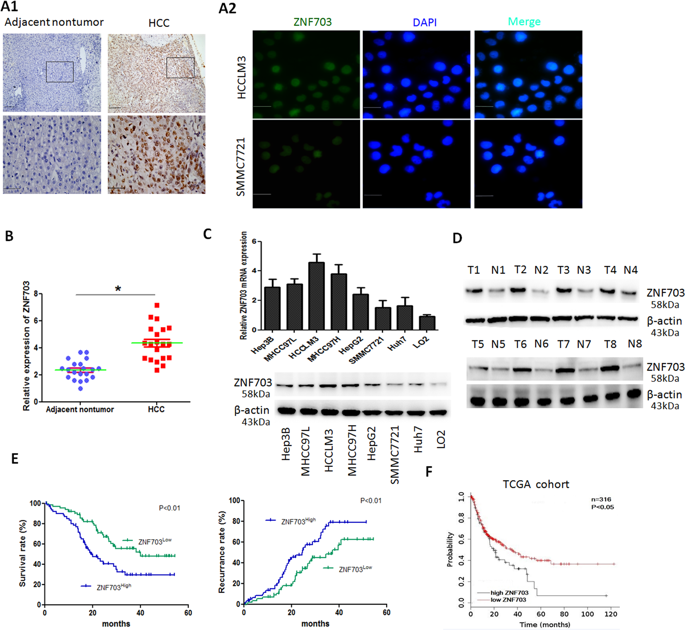Cell Death & Disease ( IF 8.1 ) Pub Date : 2020-04-08 , DOI: 10.1038/s41419-020-2422-3 Hao Wang , Hongfa Xu , Feng Ma , Meixiao Zhan , Xiangyu Yang , Shengni Hua , Wei Li , Yong Li , Ligong Lu

|
Metastasis is one of the most common reasons of hepatocellular carcinoma (HCC) death; however, the molecular mechanism underlying HCC metastasis remains incompletely defined. Here we report a new function of Zinc Finger Protein 703 (ZNF703), a member of the NET/NlZ family of zinc finger transcription factors, in promoting hepatocellular carcinoma metastasis. We demonstrated that the overexpression of ZNF703 in human HCC tissue is correlated with tumor metastasis and recurrence, it is also related with the prognosis and survival rate of patients. ZNF703 overexpression promotes HCC progression in vitro and in vivo, whereas ZNF703 knockdown has the opposite effect. In addition, ZNF703 induces epithelialmesenchymal transition (EMT) via directly binding to the CLDN4 promoter and transactivating CLDN4 expression. Downregulation of CLDN4 can attenuate ZNF703-mediated HCC metastasis, whereas upregulation of CLDN4 can reverse the decreased metastasis induced by ZNF703 knockdown. Our data revealed that ZNF703 expression is correlated with CLDN4 level, the overexpression of both ZNF703 and CLDN4 are leaded to poorer prognosis of patients with HCC. Moreover, ZNF703 knockdown can enhance the sensitivity of HCC cell to sorafenib, whereas ZNF703 overexpression has the opposite effect. These results suggested that ZNF703 might be a potential target for cancer therapies and a candidate prognostic biomarker for predicting whether patients with HCC are befitting for sorafenib treatment.
中文翻译:

锌指蛋白703通过反式激活CLDN4表达诱导肝细胞癌的EMT和索拉非尼耐药
转移是肝细胞癌(HCC)死亡的最常见原因之一;然而,肝癌转移的分子机制仍未完全确定。在这里,我们报告锌指蛋白703(ZNF703)(锌指转录因子NET / NlZ家族的成员)在促进肝癌转移中的新功能。我们证明ZNF703在人肝癌组织中的过表达与肿瘤的转移和复发有关,也与患者的预后和生存率有关。ZNF703的过表达促进了HCC在体外和体内的发展,而ZNF703的抑制则具有相反的作用。此外,ZNF703通过直接与CLDN4启动子结合并激活CLDN4表达来诱导上皮间质转化(EMT)。CLDN4的下调可以减弱ZNF703介导的HCC转移,而CLDN4的上调可以逆转ZNF703敲低诱导的转移减少。我们的数据显示ZNF703的表达与CLDN4水平相关,ZNF703和CLDN4的过表达导致HCC患者的预后较差。此外,ZNF703敲低可以增强HCC细胞对索拉非尼的敏感性,而ZNF703的过表达具有相反的作用。这些结果表明,ZNF703可能是癌症治疗的潜在靶点,并且是预测HCC患者是否适合索拉非尼治疗的预后生物标志物。我们的数据显示ZNF703的表达与CLDN4水平相关,ZNF703和CLDN4的过度表达导致HCC患者的预后较差。此外,ZNF703敲低可以增强HCC细胞对索拉非尼的敏感性,而ZNF703的过表达具有相反的作用。这些结果表明,ZNF703可能是癌症治疗的潜在靶点,并且是预测HCC患者是否适合索拉非尼治疗的预后生物标志物。我们的数据显示ZNF703的表达与CLDN4水平相关,ZNF703和CLDN4的过度表达导致HCC患者的预后较差。此外,ZNF703敲低可以增强HCC细胞对索拉非尼的敏感性,而ZNF703的过表达则相反。这些结果表明,ZNF703可能是癌症治疗的潜在靶点,并且是预测HCC患者是否适合索拉非尼治疗的预后生物标志物。

















































 京公网安备 11010802027423号
京公网安备 11010802027423号